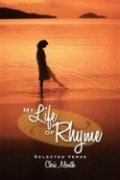Title: My Life of Rhyme: Selected Verse
Author: Chris Month
Publisher: AuthorHouse
ISBN: 978-1-4389-6248-1
Pages: 360
Genre: Poetry
Reviewed by: Derek Sun
Buy on AmazonPacific Book Review
My Life of Rhyme is an exceptionally crafted book by an extraordinarily ordinary person. It is a diverse and sprawling collection of poems written by Chris Month, a Polish Holocaust survivor and schoolteacher who has been writing poetry since she was a child. She explains in the prologue that she resorted to art as a way of expressing her emotions during her dangerous childhood and attracting the love and attention of her parents, and this book is a literary chronicle of one woman’s life, covering love, loss, and all the experiences that every human can relate to.
Divided into four sections, My Life of Rhyme features hundreds of poems both long and short, but all invariably written in the rhyming couplet style. The topics Month writes about are wide-ranging and elicit all manner of responses and emotions from celebratory and gleeful to melancholy and mournful. Although she adheres mostly to one method of composing poetry, she is inventive in her wordplay and capable of being loquacious or concise for whatever the situation calls for. Month also displays plenty of wit and earthiness in her work; on multiple occasions, she toys with readers’ expectations by swapping in an unexpected word in the place where we were ready to see innuendo and double entendre, showcasing a mind that isn’t always on the straight and narrow path, but willing to stray down some dirtier routes. Love, sex, and marriage are favorite themes of hers, and she approaches these subjects with an everlasting supply of humor, optimism, and cynicism that alternates seamlessly and receives creative expression in each of her works, which may be only several lines long or span several pages.
Month is a storyteller in rhyming practice, producing tales and essays through her poems that are testaments to her talent as a poet. She has a gift for turning her personal life stories into universally relevant tales of triumphs and tragedies that everyone goes through, making her an immensely readable poet. Readers will be pleased to encounter new ideas and subjects on almost every page. There is a subtle yet strong feminist sentiment to some of her poems, notably ones that are about dealing with aging, keeping love alive in a relationship, and raising children and grandchildren. Empathy is a resource that is never in short supply in Month’s oeuvre; it is heartwarming and a revelation to observe Month’s tender descriptions of her love for her grandchildren and her time spent with them, her diatribes against her husband’s behavior, and her anxiety at visiting the doctor, to name just a few of her subjects. These are issues that are immediately applicable to everyone at various stages of life, and Month’s work is a palpably pleasant poetic poultice for anyone dealing with any difficulty or trial in life.
Longing, the first section of the collection, introduces what will be familiar themes in the book, namely meeting and bonding with new people and finding love. The following chapter, Potpourri, lives up to its name by showing a delightfully messy variety of poems about being a parent and grandparent, traveling, being examined and treated for disease, following politics, and simply living life. Month’s focus is always on the everyday concerns of typical people, and she proves herself to be a prolific practitioner of describing life in ways that everyone can understand. Even when we may disagree with her findings, we are still amused and piqued by what she writes. Section 3, The Tackan Years, centers around Month’s career as an elementary school teacher, mentions memorable students, tedious tasks, work conflicts and many other positive and negative memories of her decades-long job. The preponderance of strangers’ names, repetition of events and obscure references combine to make this by far the weakest segment of the entire book. The main flaw is that Month’s recollections are so personal and specific that most readers will have difficulty appreciating what she is writing about, and the poems often appear too sentimental and odd. Fortunately, the fourth and final section returns to form, and offers the same meditations on love and relationships that the first part of the book did. An accomplished poet with an enormous output, Chris Month has lived an amazing life that she can recall in shocking detail. Like all good writers, she bares her soul to drill for and dig out raw and germane stories and emotions that she offers to the world. She holds up a mirror she has crafted that reflects every line, color, and shadow of our own lives and struggles, and this book is the perfect place to discover her illuminating work.


